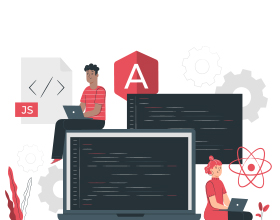- 19-Aug-2022 05:46 am
- 54 Viewed
- 0 Comments
About DevOps
Introduction
DevOps is a cultural evolution rather than an evolution of tools. DevOps is a combination of two words Development and Operations. In traditional siloed organizations, you would have separate teams like development team, testing team, deployment team, etc. (with each team having their own version control system). However, in DevOps culture, all these teams are merged into one strong software production unit with a combined version control system. In simple terms, DevOps means combined efforts of development and operations teams to bring better results through communication and collaboration to improve the processes that existed in traditional waterfall models
DevOps is a cultural evolution rather than an evolution of tools.
DevOps is a cultural evolution rather than an evolution of tools.
It's not just about adopting new technologies, it's about changing the way you work and think. This change can be challenging because it requires you to abandon your traditional development practices in favour of more agile methods that allow teams to collaborate more effectively. If you're already familiar with these new ways of working, then DevOps may seem like another tool or training course—but it isn't: DevOps is much more than that!
DevOps is a combination of two words Development and Operations.
DevOps is a combination of two words Development and Operations. It's an approach to software development that focuses on building and deploying applications faster, more efficiently, and more safely by integrating the skillsets of the whole team (Dev + Ops).
The goal is to remove silos between developers, operations staff and IT departments so that everyone can work together as one cohesive group.
In traditional siloed organizations, you would have separate teams like development team, testing team, deployment team, etc. (with each team having their own version control system).
In traditional siloed organizations, you would have separate teams like development team, testing team, deployment team and so on. Each of these teams would have their own version control system (VCS), process and tools that they use to manage the product’s codebase. This can be a lot of overhead if you work with multiple small projects or if you need to support multiple clients in your company simultaneously.
DevOps helps streamline this process by bringing together all the stakeholders into one place where they can collaborate effectively on building software products while also getting feedback from customers via automated testing processes.
However, in DevOps culture, all these teams are merged into one strong software production unit with a combined version control system.
However, in DevOps culture, all these teams are merged into one strong software production unit with a combined version control system.
DevOps is a cultural evolution rather than an evolution of tools. It’s about how you work together as an organization to deliver software faster and more reliably. In other words: What is DevOps? It’s not just about automation or process improvement; it's also about teamwork and communication between different teams within your company.
In simple terms, DevOps means combined efforts of development and operations teams to bring better results through communication and collaboration to improve the processes that existed in traditional waterfall models.
In simple terms, DevOps means combined efforts of development and operations teams to bring better results through communication and collaboration to improve the processes that existed in traditional waterfall models.
DevOps is a cultural evolution rather than an evolution of tools. It’s about changing your mindset from siloed organizations (where each team works on its own) to more collaborative ones where everyone is working together towards a common goal.
A lot has been said about the technical aspects of DevOps. But before understanding the technical aspects, it is necessary to have a clear understanding of what exactly is DevOps from the business prospective and how does it add value to our business.
Before understanding the technical aspects, it is necessary to have a clear understanding of what exactly is DevOps from the business prospective and how does it add value to our business.
DevOps is a cultural evolution that aims at bringing together software development, operations and IT management into one unified entity. It seeks to establish closer collaboration between these individuals so as to achieve faster time-to-market for products or services, as well as improved quality control through automated testing procedures which help in reducing production errors by identifying problems early on in the process.
Moreover, DevOps also helps organizations reduce costs associated with manual tasks like troubleshooting issues related with infrastructure setup rather than relying solely on human intervention such as calling support personnel at 9 AM every day after having worked till midnight last night trying fix something that isn't working properly etc., thus saving money every day instead!
Why should businesses adopt DevOps?
DevOps is a cultural evolution rather than an evolution of tools. It's not about replacing your current processes with new ones, but rather adding another layer to help you achieve what you are trying to do faster and more efficiently.
In traditional siloed organizations (for example: small startups), you would have separate teams like development team, testing team, deployment team etc.. These teams work in isolation from each other so they don't share knowledge or best practices between them because they are under separate managers who don't understand how everything works together as one whole system - this results in inefficient workflows and slow delivery timeframes which ultimately lead to failure at scale!
To produce more reliable code in less time
DevOps is a cultural evolution rather than an evolution of tools. It involves thinking about the entire software development process from beginning to end, including how you work with others, what your goals are and how you achieve them.
DevOps is about transforming teams into self-organizing organizations that can respond faster than before to change by leveraging new technologies such as automation or microservices. It's not just about sharing code between different groups within an organization—it's also about how those groups communicate with each other so they can work together more efficiently and effectively towards achieving common goals (e.g., improving quality).
Conclusion
DevOps is a cultural evolution rather than an evolution of tools.
DevOps is a combination of two words Development and Operations.
In traditional siloed organizations, you would have separate teams like development team, testing team, deployment team, etc. (with each team having their own version control system).
However, in DevOps culture, all these teams are merged into one strong software production unit with a combined version control system.
In simple terms, DevOps means combined efforts of development and operations teams to bring better results through communication and collaboration to improve the processes that existed in traditional waterfall models.





